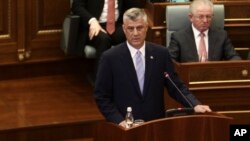Kosovo’s new president, Hashim Thaci, was sworn in Thursday in a parliamentary session boycotted by opposition parties. "With consciousness and responsibility, I will perform all my duties. I swear."
Thaci, 47, who replaces Atifete Jahjaga, was elected on February 26 in the absence of nearly all opposition lawmakers who had earlier tried to disrupt the voting with tear gas.
After taking the oath, Thaci told parliament that he will be a unifying political and civic factor, representative of all citizens of Kosovo.
He said that his goals were Kosovo's integration into NATO and the EU and the continuation of the process of normalizing relations with Serbia.
“We cannot change the past but we have to work not to repeat it," Thaci said, adding that “both countries (Kosovo and Serbia) should work to become members of the European Union as soon as possible, by facilitating and not obstructing each other.
Thaci promised that Kosovo will contribute even more actively to regional, European and global initiatives.
Earlier this week, the Constitutional Court turned down a request to void Thaci's election, saying it had found no evidence of voting irregularities, as the opposition parties – Self-Determination Movement, Alliance for the Future of Kosovo, and Initiative for Kosovo – had claimed.
A lawmaker from the opposition Self-Determination party, Ylli Hoxha, called Thaci an "illegal president" and said his party would not recognize him.
"I think that he [Thaci] was elected only through the application of brute force against opposition and peace, through the blackmail of LDK (Democratic League of Kosovo) MPs, who were clearly against his election, and through unacceptable concessions towards Serbia that goes beyond his constitutional rights. As such, he is an illegal President, we will not recognize him and we will not attend to the estimation of any of his acts," said Hoxha.
The opposition has been disrupting parliamentary proceedings since last September to protest a deal between Kosovo and Serbia that gives more power to ethnic Serbs in Kosovo and another on a border demarcation pact with Montenegro.
VOA Albanian Service contributed to this report.




